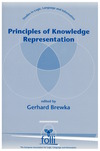
Principles of Knowledge Representationedited by Gerhard Brewka
The book contains a collection of eight survey papers written by some of the most excellent researchers in foundations of knowledge representation and reasoning. It covers topics like theories of uncertainty, nonmonotonic and casual reasoning, logic and programming, abduction, inductive logic programming, description logics, complexity in Artificial Intelligence, and model based diagnosis. It thus provides an up-to-date coverage of recent approaches to some of the most challenging problems underlying knowledge representation and Artificial Intelligence in general
Gerhard Brewka is full professor for Knowledge Based Systems at Technical University of Vienna. He is also head of the interest group of nonmonotonic reasoning of the German Gesullschaft für Informatik. His main research interests are knowledge representation, in particular nonmonotonic reasoning, preference handling, reasoning about action, models argumentation and extended logic programming.
- Contributors
- Preface
- 1 Non-Standard Theories of Uncertainty in Plausible Reasoning
Didier Dubois and Henri Prade
- 1 Introduction
- 2 Plausible Exception-Tolerant Inference
- 3 Limitations of Classical Logic
- 4 Limitations of Bayesian Networks
- 5 Lessons from Bayesian Networks
- 6 Graded Representations of Incomplete Knowledge
- 7 Possibilistic Logic
- 8 Properties of Exception-Tolerant Inference
- 9 Possibilistic Encoding of Rational Inference
- 10 Conclusion
- References
- 2 Probabilistic Foundations of Reasoning with Conditionals
Judea Pearl and Moisés Goldszmidt
- 1 Prescriptive vs. Descriptive Defaults
- 2 Infinitesimal Analysis
- 3 The Conservative Core
- 4 The Adventurous Shell
- 5 What's in an Epistemic State
- 6 Causal Conditionals, Networks, and Actions
- 7 Counterfactual Conditions
- 8 Summary
- 9 Acknowledgements
- References
- 3 Foundations of Logic Programming
Vladimir Lifschitz
- 1 Introduction
- 2 Basic Programs
- 3 Negation as Failure
- 4 Schematic Programs
- 5 Disjunctive Programs and Default Theories
- 6 Bibliographical and Historical Remarks
- References
- 4 Abductive Theories in Artificial Intelligence
Kurt Konolige
- 1 Abduction
- 2 Assumption-Based Truth Maintenance
- 3 Abduction in Non-Horn Theories
- 4 Abduction, Minimization, and Default Logic
- 5 Conclusion
- References
- 5 Inductive Logic Programming
Stefan Wrobel
- 1 Introduction
- 2 ILP: Motivation and Goals
- 3 Problem Definition and Basics
- 4 Top-Down Algorithms and Refinement Operators
- 5 Bottom-Up Algorithms
- 6 Conclusions and Suggested Further Reading
- References
- 6 Reasoning Description Logics
Francesco M. Donini, Maurizio Lenzerini, Daniele Nardi, and Andrea Schaerf
- 1 Introductiopm
- 2 Basic Notions
- 3 Reasoning with Concept Expressions
- 4 Reasoning with the ABox
- 5 Reasoning with the TBox
- 6 Reasoning in a Complete Dl-system
- 7 Conclusions
- References
- 7 Artificial Intelligence: A Computational Perspective
Bernhard Nebel
- 1 Introduction
- 2 Basic Assumptions of Computational Complexity Theory
- 3 Analyzing the Complexity of AI Problems
- 4 Coping with NP-hardness
- 5 Summary
- References
- 8 The Consistency-based Approach to Automated Diagnosis of Devices
Oskar Dressler and Peter Struss
- 1 Introduction
- 2 Consistency-based Diagnosis
- 3 Diagnosis with Fault Modes
- 4 The Diagnostic Process
- 5 Discussion and Research Issues
- References
- Index
7/31/96
ISBN (Paperback): 1575860562 (9781575860565)
ISBN (Electronic): 157586777X (9781575867779)
Subject: Philosophy; Theory of Knowledge
|



Distributed by the
University of
Chicago Press
|


